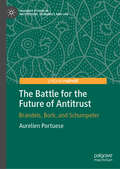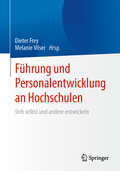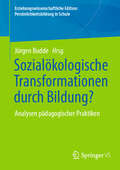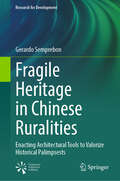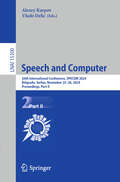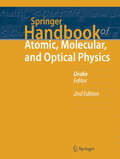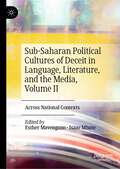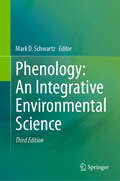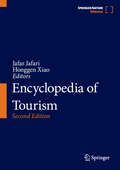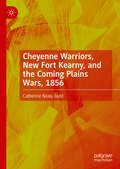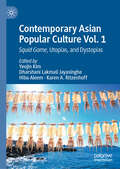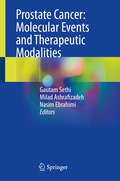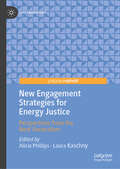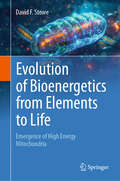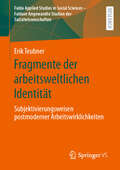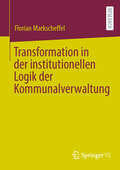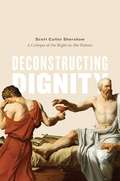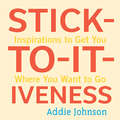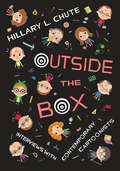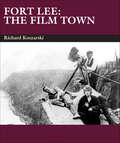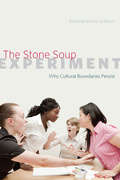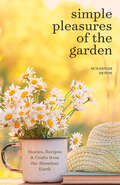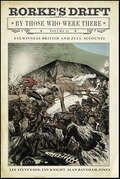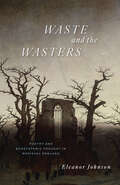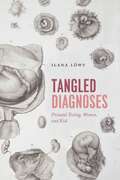- Table View
- List View
The Battle for the Future of Antitrust: Brandeis, Bork, and Schumpeter (Palgrave Studies in Institutions, Economics and Law)
by Aurelien PortueseIn an era where technology is evolving at breakneck speed and populist movements are reshaping political landscapes, the regulation of market participants stands at a critical crossroads. The future of antitrust — once a relatively stable domain of law and policy — is now caught in a fierce battle between traditional doctrines and emerging approaches that seek to address the new realities of our time. This book delves into this struggle, offering a thought-provoking exploration of how antitrust laws have evolved, how they are being challenged, and what is at stake for the future. Through a unique lens that juxtaposes the legacies of Louis Brandeis, Robert Bork, and Joseph Schumpeter, this book offers an insightful analysis of the forces shaping the future of antitrust. By tracing the historical evolution of antitrust law through economic theory and examining the ongoing debates that define today’s regulatory environment, the author provides a comprehensive yet accessible guide to the competing schools of thought in this critical field. This is a highly valuable resource for a diverse readership interested in the future of competition law and the broader regulation of innovation, from legal experts to students of law and economics, as well as professionals and policymakers navigating the complexities of market regulation.
Führung und Personalentwicklung an Hochschulen: Sich selbst und andere entwickeln
by Dieter Frey Melanie VilserDer Hochschulalltag befindet sich im Wandel und stellt Führungskräfte und Mitarbeitende vor neue Herausforderungen. Dieses Buch vermittelt wertvolle psychologische Erkenntnisse, um diesen Herausforderungen zu begegnen. Dabei beantwortet es Fragen wie z.B.: Wie führt man? Wie schafft man Synergieeffekte in Teams? Wie wählt man gute Mitarbeitende aus? Wie führt man Mitarbeiter*innengespräche? Welche Feedbackkultur fördert Potenziale bestmöglich? Wie geht man mit Stress um? Basierend auf Trainings- und Beratungswissen für LMU Mitarbeitende erhalten Sie in diesem Buch langjährig erprobte alltagstaugliche Hinweise zum Aufbau wichtiger Kompetenzen wie Selbstführung, Mitarbeiter*innenführung, Personalauswahl und -entwicklung, Zeit- und Selbstmanagement, Stressmanagement und Achtsamkeit. Zielgruppen:Das Buch richtet sich an wissenschaftliche Mitarbeitende jeder Karrierestufe in Bildungseinrichtungen, an Professor*innen, Postdoktorand*innen wie auch Doktorand*innen. Im Mittelpunkt steht die kompakte Zusammenfassung des Kernwissens für eine gesunde und erfolgreiche Entwicklung der eigenen Potenziale sowie der Potenziale von Mitarbeiter*innen und Studierenden. Zu den Herausgeber*innen:Prof. Dr. Dieter Frey ist Leiter des LMU Center for Leadership and People Management und Mitglied der Bayrischen Akademie der Wissenschaften. Dr. Melanie Vilser ist wissenschaftliche Mitarbeiterin und Trainerin am LMU Center for Leadership and People Management.
Sozialökologische Transformationen durch Bildung?: Analysen pädagogischer Praktiken (Erziehungswissenschaftliche Edition: Persönlichkeitsbildung in Schule)
by Jürgen BuddeDer Band dokumentiert aktuelle empirische Befunde rekonstruktiver Forschungsprojekte zur Frage, welchen Beitrag Bildung zu sozialökologischen Transformationen leisten kann. Damit wird auf der Basis hervorragender studentischer Abschlussarbeiten empirisch beleuchtet, was zumeist lediglich normative Forderung ist, nämlich der Beitrag der Schule zu Nachhaltigkeit. Die Beiträge analysieren schulische Bedingungen für, sowie schulische Praxis von Nachhaltigkeitsbildung. Darüber hinaus wird Nachhaltigkeitsbildung jenseits von Schule thematisiert.
Fragile Heritage in Chinese Ruralities: Enacting Architectural Tools to Valorize Historical Palimpsests (Research for Development)
by Gerardo SemprebonThis book explores the concept of fragile heritage as an architectural legacy and a territorial resource in rural China, emphasizing the significance in safeguarding its unique cultural trajectory, and laying the groundwork for future developments. Chinese rural buildings and settlements encapsulate priceless cultural values, but become increasingly vulnerable, under increasing pressures. Socioeconomic transitions, climate change, political agendas, land rent speculation, awakenings, and commodifications of cultural values, redefine the conceptual and operational framework of countryside transformation, and contribute to the debate on contemporary architectural and urban design. In this context, rural authenticity emerges as a crucial value in architectural morpho-typology, construction techniques, and expressive codes. The book introduces the notion of fragile heritage as the crossroad between folklore, academia, and practice. Next, it put in place reading methods to frame rural settlements as cultural palimpsests, indissolubly tying architectures to the landscape. These concepts are then applied to a multiscalar analysis of fifteen traditional architectures to uncover rural space and society's physical and cultural dimensions. Finally, it discusses recent revitalization projects, highlighting the potential role of architectural design. The research methodology relies on fieldwork campaigns in the Fujian and Zhejiang Provinces of China between 2017 and 2019 and a subsequent critical ri-elaboration that leverages the graphic apparatus as the fundamental investigative tool. The central idea put forward in this book is that, between tradition and innovation, the fragile heritage of past societies needs a cultural translation, interpretation, and negotiation to find space and life in the contemporary milieu.
Speech and Computer: 26th International Conference, SPECOM 2024, Belgrade, Serbia, November 25–28, 2024, Proceedings, Part II (Lecture Notes in Computer Science #15300)
by Alexey Karpov Vlado DelićThe two-volume set LNAI 15299 and 15300 constitutes the refereed proceedings of the 26th International Conference on Speech and Computer, SPECOM 2024, held in Belgrade, Serbia, during November 25–28, 2024. The 53 full papers included in these proceedings were carefully reviewed and selected from 90 submissions. The book also contains two invited talks in full paper length. The papers are organized in the following topical sections: Volume I: Invited papers; automatic speech recognition; speech and language resources; speech synthesis and perception; and speech processing for medicine. Volume II: Computational paralinguistics; affective computing; speaker recognition; digital speech processing; natural language processing.
Springer Handbook of Atomic, Molecular, and Optical Physics (Springer Handbooks)
by Gordon W. F. DrakeComprises a comprehensive reference source that unifies the entire fields of atomic molecular and optical (AMO) physics, assembling the principal ideas, techniques and results of the field. 92 chapters written by about 120 authors present the principal ideas, techniques and results of the field, together with a guide to the primary research literature (carefully edited to ensure a uniform coverage and style, with extensive cross-references). Along with a summary of key ideas, techniques, and results, many chapters offer diagrams of apparatus, graphs, and tables of data. From atomic spectroscopy to applications in comets, one finds contributions from over 100 authors, all leaders in their respective disciplines. Substantially updated and expanded since the original 1996 edition, it now contains several entirely new chapters covering current areas of great research interest that barely existed in 1996, such as Bose-Einstein condensation, quantum information, and cosmological variations of the fundamental constants. A fully-searchable CD- ROM version of the contents accompanies the handbook.
Sub-Saharan Political Cultures of Deceit in Language, Literature, and the Media, Volume II: Across National Contexts
by Isaac Mhute Esther MavenganoThis two-volume set charts a cross-disciplinary discursive terrain that proffers rich insights about deceit in contemporary postcolonial Sub-Saharan African politics. In an attempt to produce a nuanced and multifaceted academic dialoguing platform, the two volumes have a particular focus on the aspects of treachery, fear of difference (oppositional politics), and discourses/semiotics of mis/self-representation. The major aim of the proposed volumes is to contribute toward the often problematised conversations about the unfolding (post)colonial Sub-Saharan world which is topical in decolonial and Pan-African studies.The volumes seek to place political thinking and postcolonial political systems under the scholarly gaze with the view to highlight and enhance the participation of African cross-disciplinary scholarship in the postcolonial political processes of the continent. Most significantly, it is through such probing of the limitations of our own disciplinary perspectives which can help us appreciate the complexity of the postcolonial Sub-Saharan African politics. The first volume uses Zimbabwe as a case study, while the second volume examines postcolonial politics in Sub-Saharan Africa more broadly.The first volume uses Zimbabwe as a case study, while the second volume examines postcolonial politics in Sub-Saharan Africa more broadly.The first volume uses Zimbabwe as a case study, while the second volume examines postcolonial politics in Sub-Saharan Africa more broadly.
Phenology: An Integrative Environmental Science
by Mark D. SchwartzPhenology refers to recurring plant and animal life cycle stages, such as leafing and flowering, maturation of agricultural plants, emergence of insects, and migration of birds. It is also the study of these recurring events, especially their timing and relationships with weather and climate. Phenological phenomena all give a ready measure of the environment as viewed by the associated organism and are thus ideal indicators of the impact of local and global changes in weather and climate on the earth’s biosphere. Assessing our changing world is a complex task that requires close cooperation from experts in biology, climatology, ecology, geography, oceanography, remote sensing, and other areas. Like its two predecessors, this third edition of Phenology is a synthesis of current phenological knowledge, designed as a primer on the field for global change and general scientists, students, and interested members of the public. With updated and new contributions from over sixty phenological experts, covering data collection, current research, methods, and applications, it demonstrates the accomplishments, progress over the last decade, and future potential of phenology as an integrative environmental science.
Encyclopedia of Tourism
by Jafar Jafari Honggen XiaoThis encyclopedia is the most comprehensive and updated source of reference in tourism research and practice. It covers both traditional and emerging concepts and terms and is fully international in its scope. Some 769 entries by 871 internationally renowned experts from 124 countries provide a definitive access to the knowledge of tourism and its related fields. Users will find reliable and up-to-date definitions and explanations of the key terms of tourism in this reference book. Tourism is the largest industry in the world and is the main source of income for many countries. With the practical impact of worldwide tourism and the growing number of academic programs and institutions devoted to its education and research, this encyclopedia is the epicenter of this emerging and developing discipline. Editorial BoardManaging Editor: Amy Osmond Associate Editors: David Airey, Nevenka Cavlek, Peter U. C. Dieke, Juergen Gnoth, Maria Gravari-Barbas, Tazim Jamal, Kumi Kato, Francisco Madrid Flores, Yoel Mansfeld, Scott M. Meis, Regina Schlüter, Noel Scott, Honggang XuResource Editor: Beka JakeliAssistant Editors: S. Vida Muse, Peter Reim, Shun YeCartographers: Kisandul Kumarasinghe, Ashan Manamperi, Himanshi Withanage
Cheyenne Warriors, New Fort Kearny, and the Coming Plains Wars, 1856
by Catherine Nealy JuddIn this book, Catherine Nealy Judd demonstrates the profound significance of a U.S military siege rashly launched from Fort Kearny against a small war party of Northern Cheyenne. This event occurred on the Platte River Road in August 1856 and triggered four Cheyenne reprisal counterattacks. Drawing on history, anthropology, geography, cultural studies, military records, governmental archives, diaries, letters, and other primary sources, Judd scrutinizes a tumultuous moment in the pre-railroad expansionist era, presenting her readers with a tale of struggle between Indigenous Americans and an increasingly aggressive federal military stationed at the forts of the Plains. As Judd scrutinizes the causes, conduct, and consequences of this long-neglected series of events, her insights encourage us to reassess the trajectories of federal aggression and of an Indigenous response to that bellicosity. By placing the Cheyenne Nation at the center of the history of the Overland Trail, this study offers a long overdue reinterpretation of the Platte River Road in the 1850s and beyond.
Contemporary Asian Popular Culture Vol. 1: Squid Game, Utopias, and Dystopias
by Karen A. Ritzenhoff Yeojin Kim Dharshani Lakmali Jayasinghe Hiba AleemThis first of two volumes explores how contemporary Asian popular culture reflects and critiques social issues. The authors, from different scholarly backgrounds, examine how shows like Squid Game present a scathing critique of oppressive socio-economic structures, conceptualize national heterotopias, utopias, and dystopias, and facilitate understanding of identity formation and discourses of resistance. The volume encompasses chapters discussing themes that intersect gender, race, politics, and social dynamics. It showcases ongoing developments in Asian popular culture in the wake of the global popularity of Squid Game and in anticipation of its second season release in December 2024.
Prostate Cancer: Molecular Events and Therapeutic Modalities
by Gautam Sethi Milad Ashrafizadeh Nasim EbrahimiThe book covers the various cell signaling pathways responsible for prostate cancer progression, conventional therapies used for prostate cancer treatment, new emerging therapeutics, and challenges in the treatment of cancer patients. It describes the different molecular pathways responsible for prostate cancer progression to improve readers' knowledge about the role of signaling networks, and cellular and molecular aspects of prostate cancer progression. These topics include mechanisms responsible for prostate cancer malignancy with a focus on molecular pathways. It also discusses the current challenges in prostate cancer treatment such as drug resistance and immune evasion and introduces novel therapeutics such as gene therapy and nanotherapeutics for prostate cancer. This book is completely novel and unique and covers all aspects of prostate cancer progression and challenges in therapy while presenting solutions. Written by prestigious researchers around the world, this book will be interesting to researchers and practitioners, especially those working in urological cancers.
New Engagement Strategies for Energy Justice: Perspectives from the Next Generation (Just Transitions)
by Alicia Phillips Laura KaschnyThis book offers an innovative exploration of energy justice, from concept to action, highlighting its role as a crucial tool for navigating the complexities of a just and sustainable energy transition. The book is timely and as the global energy transition rapidly progresses, it will serve as an essential resource, offering practical guidance to advancing a just and sustainable energy future. The perspectives presented in this book are presented by early career energy justice scholars from around the world, each highlighting and proposing ways to navigate the transition. The discussion focuses on three key themes: the integration and repurposing of energy infrastructures with the use of technology, the need for affordable and accessible energy services, and the promotion of responsible governance through effective policymaking and corporate social responsibility. At the heart of this book is the presentation of the ‘Toolkit to Achieve the Just Transition using the Energy Justice Framework’.
Evolution of Bioenergetics from Elements to Life: Emergence of High Energy Mitochondria
by David F. StoweThis book begins with the creation of the elements used in life and how these elements, as atoms, bound together into organic compounds and polymerized into lipids, peptides, and nucleotides. The text stresses the role and importance of the elements C, H, O, N, P, S, the univalent and multivalent ions, and the requirement of liquid water to foster prebiotic life. Expert author Dr. David Stowe explains the role of early molecular interactions in developing the first living prokaryote bacteria and their eventual engulfment as organelles to make eukaryotes that allowed their sophistication into specialized cells and large multicellular organisms. The book uniquely traces the genesis of bioenergetics and uses cardiac cell mitochondia as an evolutionary example for modern bioenergetic function. This book is geared toward graduate students, post-doctoral fellows, and other academics interested in evolutionary biochemistry with an emphasis on the early development of bioenergetics leading to modern, high energy mitochondria.
Fragmente der arbeitsweltlichen Identität: Subjektivierungsweisen postmoderner Arbeitswirklichkeiten (Fulda Applied Studies in Social Sciences – Fuldaer Angewandte Studien der Sozialwissenschaften #1)
by Erik TeubnerSeit dem Zeitalter des Postindustrialismus wird im Rahmen der Erwerbsarbeit verstärkt auf Subjektivität eingegangen. Doch wie beeinflusst Arbeit unser Selbstverständnis genau? Im Zeichen der Arbeitsforschung widmet sich dieses Werk der Aufgabe, verschiedene Facetten der Subjektivierung in der postmodernen Arbeitswelt aufzudecken. In fragmentarischem Stil behandelt jedes Kapitel einen anderen Phänomenbereich: von Zugehörigkeit, Anerkennung und Macht über Intrapreneurship und Sinn bis hin zu Zeit und Humor am Arbeitsplatz. Die jeweiligen Untersuchungen zu diesen Dimensionen von Arbeit eröffnen ein neues Reflexionsniveau für die Arbeitsforschung zur Frage, wie Imperative, Praktiken und Erfahrungen der postmodernen Arbeitswelt die persönliche Identität prägen und verändern. Das vorgestellte Konzept der lebensweltlichen Subjektivierung bietet dabei einen umfassenden Rahmen für eine interdisziplinäre Perspektivierung der Subjektivierungsanalyse, die sich auf Diskursforschung, Praxistheorie und Leibphänomenologie stützt. Dieses Buch lädt gleichsam dazu ein, dialektisch in die vielfältigen Selbstpositionierungen des Arbeitsalltags einzutauchen.
Transformation in der institutionellen Logik der Kommunalverwaltung
by Florian MarkscheffelDie Kommunalverwaltungen in Deutschland befinden sich in einem akuten Spannungsfeld: Der Reformdruck steigt, aufgrund diverser Herausforderungen wird eine neue Rolle gefordert, um gestaltend und moderierend auf die lokale sozial-ökologische Transformation zu wirken. Dem gegenüber steht jedoch eine fachlich wie gesellschaftlich debattierte Veränderungsresistenz der Verwaltung: Die Strukturen der Verwaltung scheinen ein Beharren auf etablierte Institutionen und Routinen zu befördern. Das vorliegende soziologische Buch adressiert diese Beharrungskräfte. Den theoretischen Rahmen stellen der Sozialkonstruktivismus sowie die institutionellen Logiken dar, empirisch wird eine Fallstudie im Modus des Transformativen Forschens mit explorierenden und narrativen Methoden ergründet. Die Stadtverwaltung der Fallstudie durchläuft einen Veränderungsprozess, der auf den Reformdruck eingeht. Im Fokus stehen die Erzählungen und Erlebnisse der Verwaltungsmitarbeitenden. Analysiert wurden die beschriebenen Institutionen und Routinen des Arbeitsalltages in der Verwaltungskultur, sowie die wahrgenommenen Herausforderungen im Change Prozess. Es zeigt sich, dass der Widerstand gegen Transformationen in der Struktur der Verwaltung verankert ist. Dementsprechendes Handeln der Mitarbeitenden wird in der institutionalen Ordnung befördert, unangemessenes Verhalten vermieden.
Deconstructing Dignity: A Critique of the Right-to-Die Debate
by Scott Cutler ShershowThe right-to-die debate has gone on for centuries, playing out most recently as a spectacle of protest surrounding figures such as Terry Schiavo. In Deconstructing Dignity, Scott Cutler Shershow offers a powerful new way of thinking about it philosophically. Focusing on the concepts of human dignity and the sanctity of life, he employs Derridean deconstruction to uncover self-contradictory and damaging assumptions that underlie both sides of the debate. Shershow examines texts from Cicero’s De Officiis to Kant’s Groundwork of the Metaphysics of Morals to court decisions and religious declarations. Through them he reveals how arguments both supporting and denying the right to die undermine their own unconditional concepts of human dignity and the sanctity of life with a hidden conditional logic, one often tied to practical economic concerns and the scarcity or unequal distribution of medical resources. He goes on to examine the exceptional case of self-sacrifice, closing with a vision of a society—one whose conditions we are far from meeting—in which the debate can finally be resolved. A sophisticated analysis of a heated topic, Deconstructing Dignity is also a masterful example of deconstructionist methods at work.
Stick-to-it-iveness: Inspirations to Get You Where You Want to Go
by Addie Johnson“Stick-to-it-iveness is a funny word,” Addie Johnson writes in the introduction of this small profound volume. “Some might say it’s not even a real word, but it speaks for itself.” In her winsome, quirky, inspirational style, Johnson shares ideas that inspire us to make light of the hard work of achieving our dreams. This is a book that attests to the power of a little bit at a time. There’s a simple key to accomplishing our wildest dreams—a secret, hidden in plain view--sticking to it.
Outside the Box: Interviews with Contemporary Cartoonists
by Hillary L. ChuteWe are living in a golden age of cartoon art. Never before has graphic storytelling been so prominent or garnered such respect: critics and readers alike agree that contemporary cartoonists are creating some of the most innovative and exciting work in all the arts. For nearly a decade Hillary L. Chute has been sitting down for extensive interviews with the leading figures in comics, and with Outside the Box she offers fans a chance to share her ringside seat. Chute’s in-depth discussions with twelve of the most prominent and accomplished artists and writers in comics today reveal a creative community that is richly interconnected yet fiercely independent, its members sharing many interests and approaches while working with wildly different styles and themes. Chute’s subjects run the gamut of contemporary comics practice, from underground pioneers like Art Spiegelman and Lynda Barry, to the analytic work of Scott McCloud, the journalism of Joe Sacco, and the extended narratives of Alison Bechdel, Charles Burns, and more. They reflect on their experience and innovations, the influence of peers and mentors, the reception of their art and the growth of critical attention, and the crucial place of print amid the encroachment of the digital age. Beautifully illustrated in full-color, and featuring three never-before-published interviews—including the first published conversation between Art Spiegelman and Chris Ware—Outside the Box will be a landmark volume, a close-up account of the rise of graphic storytelling and a testament to its vibrant creativity.
Fort Lee: The Film Town (1904-2004)
by Richard KoszarskiDuring the 1910s, motion pictures came to dominate every aspect of life in the suburban New Jersey community of Fort Lee. During the nickelodeon era, D.W. Griffith, Mary Pickford, and Mack Sennett would ferry entire acting companies across the Hudson to pose against the Palisades. Theda Bara, "Fatty" Arbuckle, and Douglas Fairbanks worked in the rows of great greenhouse studios that sprang up in Fort Lee and the neighboring communities. Tax revenues from studios and laboratories swelled municipal coffers.Then, suddenly, everything changed. Fort Lee, the film town once hailed as the birthplace of the American motion picture industry, was now the industry's official ghost town. Stages once filled to capacity by Paramount and Universal were leased by independent producers or used as paint shops by scenic artists from Broadway. Most of Fort Lee's film history eventually burned away, one studio at a time.Richard Koszarski re-creates the rise and fall of Fort Lee filmmaking in a remarkable collage of period news accounts, memoirs, municipal records, previously unpublished memos and correspondence, and dozens of rare posters and photographs—not just film history, but a unique account of what happened to one New Jersey town hopelessly enthralled by the movies.Distributed for John Libbey Publishing
The Stone Soup Experiment: Why Cultural Boundaries Persist
by Deborah DowningThe Stone Soup Experiment is a remarkable story of cultural difference, of in-groups, out-groups, and how quickly and strongly the lines between them are drawn. It is also a story about simulation and reality, and how quickly the lines between them can be dismantled. In a compulsively readable account, Deborah Downing Wilson details a ten-week project in which forty university students were split into two different simulated cultures: the carefree Stoners, and the market-driven Traders. Through their eyes we are granted intimate access to the very foundations of human society: how group identities are formed and what happens when opposing ones come into contact. The experience of the Stoners and Traders is a profound testament to human sociality. Even in the form of simulation, even as a game, the participants found themselves quickly—and with real conviction—bound to the ideologies and practices of their in-group. The Stoners enjoyed their days lounging, chatting, and making crafts, while the Traders—through a complex market of playing cards—competed for the highest bankrolls. When they came into contact, misunderstanding, competition, and even manipulation prevailed, to the point that each group became so convinced of its own superiority that even after the simulation’s end the students could not reconcile. Throughout her riveting narrative, Downing Wilson interweaves fascinating discussions on the importance of play, emotions, and intergroup interaction in the formation and maintenance of group identities, as well as on the dynamic social processes at work when different cultural groups interact. A fascinating account of social experimentation, the book paints a vivid portrait of our deepest social tendencies and the powers they have over how we make friends and enemies alike.
Simple Pleasures of the Garden: Stories, Recipes & Crafts from the Abundant Earth (Simple Pleasures Ser.)
by Susannah SetonSimple Pleasures Throughout the Year “Simple Pleasures has become my go-to book for remembering to slow down and enjoy the little things in life.” —Becca Anderson, bestselling author of Badass Affirmations, The Book of Awesome Women, and moreAn abundant sourcebook of ideas, encouraging quotes, recipes, and soothing activitiesSimple Pleasures of the Garden shows you how to appreciate the simple things within your daily activities. The secret to living well year round can be found in the abundance of your home garden, so get to planting those seeds of simple joys and herbal healing! Nurture your mind, body, and soul. Sometimes finding the positive can be hard, but it doesn’t have to be. From the recipe for a homemade herbal bath for a spa day to quick and easy recommendations for an instant room makeover, the suggestions and home recipes collected in this book offer a new appreciation for the everyday activities that nurture and comfort you.Simplify your emotional self care. Taking care of yourself doesn’t have to be expensive, unrealistic, or inaccessible. It can be as easy as tending to a green garden, making healing herbal tonics, sipping calming teas, or spending time with other natural energy boosters. Pleasures are made, not bought, so unlock new secrets to happiness with these touching stories, practical tips, and satisfying crafts. Inside this positive attitude book you’ll find: Ways to decorate your home with nature crafts, growing herbs, and an air of magic Advice on how to foster a routine for a rejuvenating self care yearTips on how to become the gardener of your moods and emotionsIf you liked seasonal self care books like A Year of Self-Care, Grow Your Own Medicine, or A Woman’s Garden, you’ll love Simple Pleasures of the Garden.
Rorke's Drift By Those Who Were There, Volume II: Eyewitness British and Zulu Accounts
by Ian Knight Lee Stevenson Alan Baynham-Jones"Yes you have beaten us; you had the best guns, but we have the best men...But we’ll fight again in two or three years’ time." – Prince Dabulamanzi kaMpande (who led the Zulu at Rorke’s Drift) On 22 January 1879, during the final hour of the Battle of Isandlwana – one of the greatest disasters ever to befall British troops during the Victorian era – a very different story was about to unfold a few miles away at the mission station of Rorke’s Drift. A Zulu force of more than 3,000 warriors had turned their attention to the small outpost, defended by around 150 British and Imperial troops. The odds of the British surviving were staggeringly low. The British victory that ensued, therefore, would go down as one of the most heroic actions of all time, and has fascinated military history enthusiasts for decades. In this classic work, Anglo-Zulu War experts Lee Stevenson, Alan Baynham-Jones and Ian Knight examine a wide range of personal testimonies from those present at Rorke’s Drift, while also presenting a clear overview of the battle in its entirety. By reading this account, readers will gain an impressive, unique breadth of knowledge about one of the most epic battles in British history. This updated edition includes even more first-person accounts from the combatants on both the British and Zulu sides. Providing personal, microscopic accounts of events, while at the same time presenting a clear overview of the battle in its entirety, this second volume completes the collection of accounts of the defenders of Rorke’s Drift and also includes contemporary accounts of those who saw the immediate aftermath of the battle.
Waste and the Wasters: Poetry and Ecosystemic Thought in Medieval England
by Eleanor JohnsonA groundbreaking examination of ecological thought in medieval England. While the scale of today’s crisis is unprecedented, environmental catastrophe is nothing new. Waste and the Wasters studies the late Middle Ages, when a convergence of land contraction, soil depletion, climate change, pollution, and plague subsumed Western Europe. In a culture lacking formal scientific methods, the task of explaining and coming to grips with what was happening fell to medieval poets. The poems they wrote used the terms “waste” or “wasters” to anchor trenchant critiques of people’s unsustainable relationships with the world around them and with each other. In this book, Eleanor Johnson shows how poetry helped medieval people understand and navigate the ecosystemic crises—both material and spiritual—of their time.
Tangled Diagnoses: Prenatal Testing, Women, and Risk
by Ilana LöwySince the late nineteenth century, medicine has sought to foster the birth of healthy children by attending to the bodies of pregnant women, through what we have come to call prenatal care. Women, and not their unborn children, were the initial focus of that medical attention, but prenatal diagnosis in its present form, which couples scrutiny of the fetus with the option to terminate pregnancy, came into being in the early 1970s.Tangled Diagnoses examines the multiple consequences of the widespread diffusion of this medical innovation. Prenatal testing, Ilana Löwy argues, has become mainly a risk-management technology—the goal of which is to prevent inborn impairments, ideally through the development of efficient therapies but in practice mainly through the prevention of the birth of children with such impairments. Using scholarship, interviews, and direct observation in France and Brazil of two groups of professionals who play an especially important role in the production of knowledge about fetal development—fetopathologists and clinical geneticists—to expose the real-life dilemmas prenatal testing creates, this book will be of interest to anyone concerned with the sociopolitical conditions of biomedical innovation, the politics of women’s bodies, disability, and the ethics of modern medicine.
